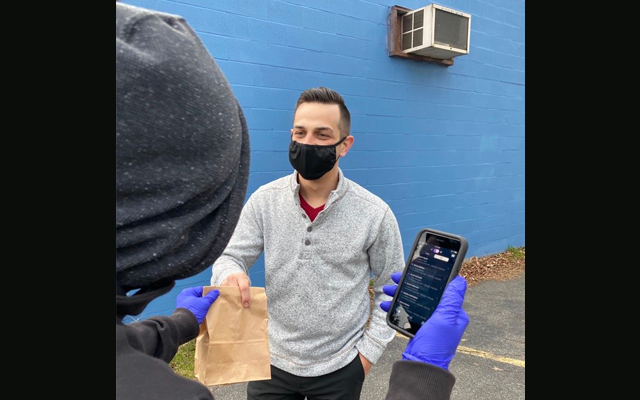Ridesharing giant Uber recently took a step into the cannabis industry in Canada by announcing a partnership with regional dispensary Tokyo Smoke. Uber will take orders through its UberEats platform, but consumers still need to go into the dispensary to get their products. Uber isn’t actually delivering cannabis yet. However the ride-hailing company can use this opportunity to gather data on how consumers use the service so they can fine-tune their offerings for further expansion in Canada or even into the U.S. down the road.
Enter Uber
While Uber is experimenting today, they still haven’t cracked the last mile of delivery. Onfleet has focused on last mile delivery since the company was founded, and we recognize some of the unique challenges for retailers in the cannabis sector. For example, if dispensaries don’t manage the complete order and fulfillment process, there’s a chance consumers will see Uber as the merchant, not the dispensary, which could hurt brand awareness or commodify the experience. This could hurt a retailer’s direct relationship with the consumer.
On the flip side, having such a large public company as Uber entering the cannabis space is also a significant endorsement for the credibility of the market and long-term potential growth. This endorsement and new awareness could bring in potential consumers who might be open to trying edibles, topical creams or tinctures, but don’t even know these non-flower options are available today.
Delivery requires a personal touch
So what are the hurdles that Uber would face if they expand to delivery in Canada? Certainly they have a responsibility to follow a variety of regulatory requirements and local restrictions. One of the challenges in the US market is the fact that some counties or cities only allow cannabis delivery, not store-front retail. Onfleet recently published a three-part blog series that explains some of the options to support cannabis companies where physical dispensaries are not legal and delivery is the only option.
Eaze has flourished in California with a delivery-only format since starting in 2014 in San Francisco. In 2021, Eaze announced a massive expansion plan by acquiring Green Dragon, to serve markets such as Colorado and Florida, along with Eaze’s current operations in California and Michigan. Eaze is joined by other companies such as Amuse and Herbarium that have seen noticeable growth in their manufacturing and distribution by owning their delivery experience.
How does cannabis fit Uber?
So why did Uber choose to do pick-up only? Well, just providing an ordering platform that routes sales directly to the dispensary means they don’t need to check IDs, certify drivers or go through the full licensing process in Canada. Uber isn’t necessarily looking to take over the market with this move, they are simply dipping their toes in. And with such a brand behind them, they could do what Tesla Motors did for electric vehicles – drive other producers and companies to embrace these new markets. If Uber can do it, so can DoorDash.
Uber could also be laying the groundwork for a bigger step into the cannabis space, such as how they entered the alcohol space by purchasing Drizly. The cannabis market is heavily regulated, making it harder for companies to ensure their procedures follow the law. Uber is navigating these issues right now as they learn more about the market and consumer habits.
One of the main strengths of Uber is its on-demand, ad hoc driver network, so expanding into cannabis may flop without a crew of experienced drivers. Uber can influence and impact the pool of ride-share drivers with time-sensitive bonuses or rewards. But finding legally-qualified drivers is another problem, even with national legalization in Canada. Delivery drivers still must have a CannSell certificate, making it tougher to add new drivers as quickly as Uber can with food or ride-sharing.
Heading to the U.S. next?
Uber CEO Dara Khosrowshahi has discussed expanding to the United States cannabis market after federal legalization passes. In the meantime, getting individually licensed in all 36 states with legal cannabis is more than the company is ready for. Ultimately the overall goal for the industry is to expand cannabis acceptance for medicinal and recreational use. A massive company like Uber stepping into the space is a good step for awareness, however customers may prefer a more individualized, personal, boutique-style interaction and the driver knowledge and experience that has worked well for dispensaries today. Consumers with privacy concerns may also prefer to stick with local dispensaries instead of providing a large company with their cannabis purchasing information.
Ultimately, more options for customers to purchase cannabis will benefit the industry. Uber may not change the industry with this expansion into Canada yet. But they can lay the groundwork for a large-scale approach when the time is right in the U.S.
Should businesses be worried about Uber entering this market now? Not today. Onfleet has been operating in the cannabis sector since the nascent days of legislation and we’ve assisted copious cannabis operators with their last mile delivery needs. The demand is there and will remain strong. Laws vary widely by location and regulators want to see knowledgeable employees at the point of purchase. But long-term, as more people discover the benefits of cannabis, large corporations will keep making moves into the market. From what we’ve seen at Onfleet, dispensaries will do well if they continue to nurture their direct consumer relationships, and provide the type of personalized interaction that meets each customer’s needs.






